Michael Feinstein With Jule Styne - Michael Feinstein Sings - The Jule Styne Songbook (1991)
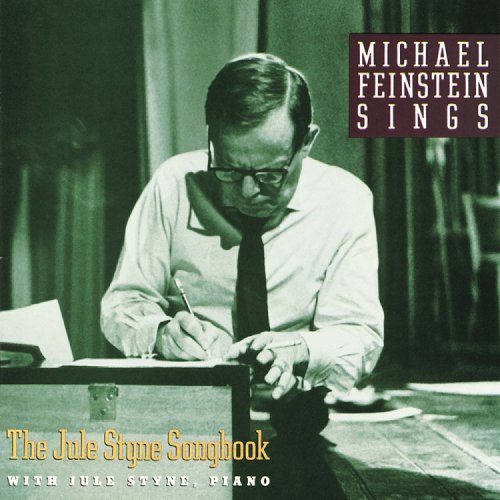
Artist: Michael Feinstein With Jule Styne
Title: Michael Feinstein Sings - The Jule Styne Songbook
Year Of Release: 1991
Label: Elektra Nonesuch
Genre: Pop, Vocal Jazz, Stage & Screen, Ballad
Quality: Mp3 320 / Flac (tracks)
Total Time: 58:03
Total Size: 145/274 Mb
WebSite: Album Preview
Title: Michael Feinstein Sings - The Jule Styne Songbook
Year Of Release: 1991
Label: Elektra Nonesuch
Genre: Pop, Vocal Jazz, Stage & Screen, Ballad
Quality: Mp3 320 / Flac (tracks)
Total Time: 58:03
Total Size: 145/274 Mb
WebSite: Album Preview
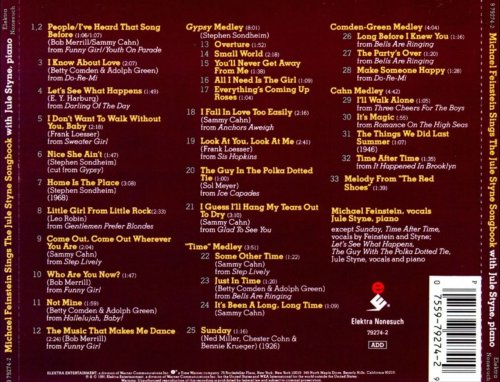
Tracklist:
01. People
02. I've Heard That Song Before
03. I Know About Love
04. Let's See What Happens
05. I Don't Want to Walk without You, Baby
06. Nice She Ain't
07. Home Is the Place
08. Little Girl from Little Rock
09. Come Out, Come Out Wherever You Are
10. Who Are You Now?
11. Not Mine
12. The Music That Makes Me Dance
13. Gypsy Medley, Overture
14. Gypsy Medley, Small World
15. Gypsy Medley, You'll Never Get Away from Me
16. Gypsy Medley, All I Need Is a Girl
17. Gypsy Medley, Everything's Coming Up Roses
18. I Fall in Love too Easily
19. Look at You, Look at Me
20. The Guy in the Polka Dotted Tie
21. I Guess I'll Hang My Tears out to Dry
22. "Time" Medley, Some Other Time
23. "Time" Medley, Just in Time
24. "Time" Medley, It's Been a Long, Long Time
25. Sunday
26. Comden-Green Medley, Long Before I Knew You
27. Comden-Green Medley, The Party's Over
28. Comden-Green Medley, Make Someone Happy
29. Cahn Medley, I'll Walk Alone
30. Cahn Medley, It's Magic
31. Cahn Medley, The Things We Did Last Summer
32. Cahn Medley, Time After Time
33. Melody from "The Red Shoes"
Singer/pianist Michael Feinstein was both a prime motivator and a beneficiary of a renewed interest in pre-rock popular music that started in the 1980s, a trend that also found Linda Ronstadt selling millions of copies of albums of traditional pop made with conductor Nelson Riddle and that fueled the success of Harry Connick Jr. In Feinstein's case, it allowed him to establish a career as a nightclub entertainer and then move up to theaters while releasing major-label albums; his background as a musical archivist also enabled him to bring a scholar's knowledge to his performances of classic pop music.
Pure Gershwin He was born Michael Jay Feinstein on September 7, 1956, in Columbus, Ohio. His father, Edward Feinstein, was an executive in the meat business, but had been a band singer, while his mother, Mazie Feinstein, was an amateur tap dancer. Beginning to play the piano by ear at age five, Feinstein grew up fascinated by the pop music of generations preceding him and amassed a large record collection. He moved with his family to Los Angeles in 1976, and there began to come in contact with the people who created the music he adored. He was hired by Ira Gershwin to catalog the veteran lyricist's archives, a job he performed until Gershwin's death in 1983. (He also worked for Harry Warren in 1981-1982.) At that point, he turned to performing as a cabaret artist full-time, beginning in Los Angeles. In 1985, he released his debut album, Pure Gershwin, on Parnassus Records. A 1986 engagement at the Oak Room of the Algonquin Hotel in New York was extended for four months and resulted in the LP Live at the Algonquin (Elektra, 1987). After releasing Remember: Michael Feinstein Sings Irving Berlin (1987), he was able to take his act to Broadway, opening Michael Feinstein in Concert: Isn't It Romantic at the Lyceum Theatre on April 19, 1988. The same year, he released his third album, also called Isn't It Romantic. During 1989, he released two thematic albums, Over There (Angel), devoted to the music of World War I, and The M.G.M. Album (Elektra).
Pure Imagination For Elektra's Nonesuch imprint, Feinstein launched a series of "songbook" albums recorded with the participation of the veteran songwriters themselves, the first of them devoted to Burton Lane (August 1990, with a second volume in November 1992), followed by Jule Styne (October 1991), Jerry Herman (October 1993), and Hugh Martin (September 1995). Back at Elektra, Feinstein devoted an album to children, Pure Imagination (April 1992). Forever (March 1993) found him balancing contemporary material with the usual standards. He then switched labels, landing at Atlantic Records for Such Sweet Sorrow (March 1995) and Nice Work If You Can Get It: Songs by the Gershwins (February 1996) before moving to Concord Records, beginning with an album to mark the centenary of George Gershwin, Michael & George: Feinstein Sings Gershwin (September 1998).
Big City Rhythms In 1999, Feinstein lent his name to a new nightclub in New York located in the Regency Hotel, as Feinstein's at the Regency became a venue for sophisticated cabaret entertainers including its namesake. (A second Feinstein's later opened in Hollywood.) The same year, he released Big City Rhythms, fronting the Maynard Ferguson Big Band. Romance on Film/Romance on Broadway (October 2000) was a two-CD set, the first disc recorded live. It was followed by Michael Feinstein with the Israel Philharmonic Orchestra in May 2002. In the fall of 2002, Concord announced the formation of Feinstein's own custom subsidiary label, Feinery, intended to "present hidden gems from the American Popular Songbook." It was launched with a new album, Michael Feinstein Sings the Livingston & Evans Songbook, on October 8, 2002. Feinstein's 2003 album, Only One Life, was devoted to the songs of Jimmy Webb. In 2005, he and George Shearing teamed up for Hopeless Romantics. The Sinatra Project appeared in 2008. In 2009, Feinstein and Broadway star Cheyenne Jackson made The Power of Two for Harbinger Records. Fly Me to the Moon (September 2010) on the Duckhole label found him accompanied by jazz guitarist Joe Negri. In 2011, Feinstein followed up his 2008 homage to Sinatra with The Sinatra Project, Vol. 2: The Good Life.
Pure Gershwin He was born Michael Jay Feinstein on September 7, 1956, in Columbus, Ohio. His father, Edward Feinstein, was an executive in the meat business, but had been a band singer, while his mother, Mazie Feinstein, was an amateur tap dancer. Beginning to play the piano by ear at age five, Feinstein grew up fascinated by the pop music of generations preceding him and amassed a large record collection. He moved with his family to Los Angeles in 1976, and there began to come in contact with the people who created the music he adored. He was hired by Ira Gershwin to catalog the veteran lyricist's archives, a job he performed until Gershwin's death in 1983. (He also worked for Harry Warren in 1981-1982.) At that point, he turned to performing as a cabaret artist full-time, beginning in Los Angeles. In 1985, he released his debut album, Pure Gershwin, on Parnassus Records. A 1986 engagement at the Oak Room of the Algonquin Hotel in New York was extended for four months and resulted in the LP Live at the Algonquin (Elektra, 1987). After releasing Remember: Michael Feinstein Sings Irving Berlin (1987), he was able to take his act to Broadway, opening Michael Feinstein in Concert: Isn't It Romantic at the Lyceum Theatre on April 19, 1988. The same year, he released his third album, also called Isn't It Romantic. During 1989, he released two thematic albums, Over There (Angel), devoted to the music of World War I, and The M.G.M. Album (Elektra).
Pure Imagination For Elektra's Nonesuch imprint, Feinstein launched a series of "songbook" albums recorded with the participation of the veteran songwriters themselves, the first of them devoted to Burton Lane (August 1990, with a second volume in November 1992), followed by Jule Styne (October 1991), Jerry Herman (October 1993), and Hugh Martin (September 1995). Back at Elektra, Feinstein devoted an album to children, Pure Imagination (April 1992). Forever (March 1993) found him balancing contemporary material with the usual standards. He then switched labels, landing at Atlantic Records for Such Sweet Sorrow (March 1995) and Nice Work If You Can Get It: Songs by the Gershwins (February 1996) before moving to Concord Records, beginning with an album to mark the centenary of George Gershwin, Michael & George: Feinstein Sings Gershwin (September 1998).
Big City Rhythms In 1999, Feinstein lent his name to a new nightclub in New York located in the Regency Hotel, as Feinstein's at the Regency became a venue for sophisticated cabaret entertainers including its namesake. (A second Feinstein's later opened in Hollywood.) The same year, he released Big City Rhythms, fronting the Maynard Ferguson Big Band. Romance on Film/Romance on Broadway (October 2000) was a two-CD set, the first disc recorded live. It was followed by Michael Feinstein with the Israel Philharmonic Orchestra in May 2002. In the fall of 2002, Concord announced the formation of Feinstein's own custom subsidiary label, Feinery, intended to "present hidden gems from the American Popular Songbook." It was launched with a new album, Michael Feinstein Sings the Livingston & Evans Songbook, on October 8, 2002. Feinstein's 2003 album, Only One Life, was devoted to the songs of Jimmy Webb. In 2005, he and George Shearing teamed up for Hopeless Romantics. The Sinatra Project appeared in 2008. In 2009, Feinstein and Broadway star Cheyenne Jackson made The Power of Two for Harbinger Records. Fly Me to the Moon (September 2010) on the Duckhole label found him accompanied by jazz guitarist Joe Negri. In 2011, Feinstein followed up his 2008 homage to Sinatra with The Sinatra Project, Vol. 2: The Good Life.
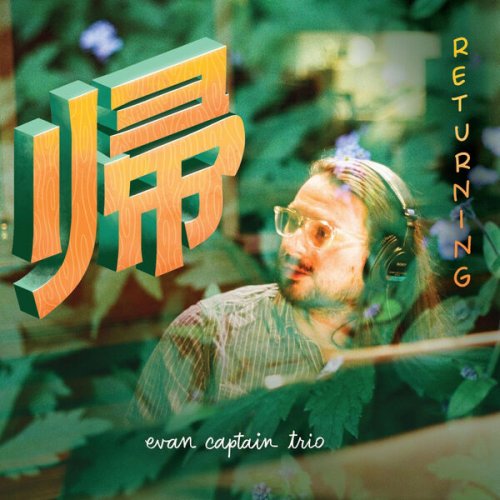
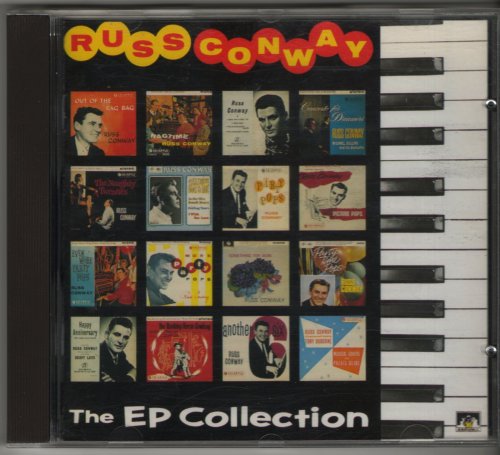
![Jan Harbeck Quartet - Arena (2026) [Hi-Res] Jan Harbeck Quartet - Arena (2026) [Hi-Res]](https://img.israbox.com/img/2026-02/21/ta1geqbunymda1vazij2b7te7.jpg)
![Joe Pass - Virtuoso (1974) [2025 DSD256] Joe Pass - Virtuoso (1974) [2025 DSD256]](https://www.dibpic.com/uploads/posts/2026-02/1771609997_ff.jpg)
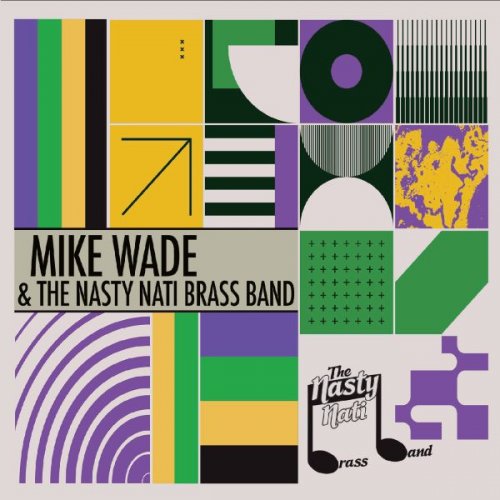
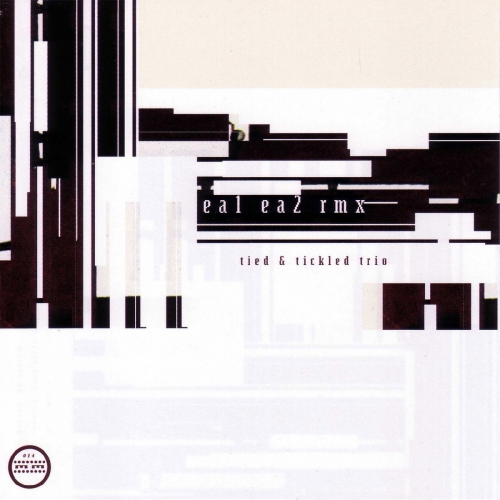
![Magda Mayas' Filamental - Murmur (2026) [Hi-Res] Magda Mayas' Filamental - Murmur (2026) [Hi-Res]](https://www.dibpic.com/uploads/posts/2026-02/1771663724_i3cjtptz4ae2l_600.jpg)
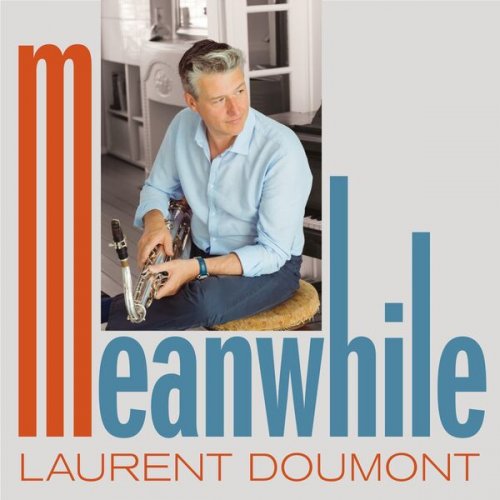
![Tom Braxton - Flashback (2026) [Hi-Res] Tom Braxton - Flashback (2026) [Hi-Res]](https://www.dibpic.com/uploads/posts/2026-02/1771426129_1.jpg)